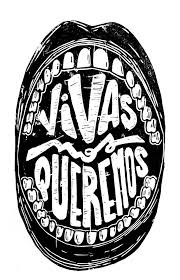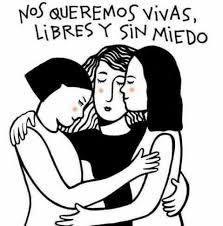Storia di una mujer (English version below)
- The Rolling Potato

- 17 feb 2020
- Tempo di lettura: 4 min
Aggiornamento: 19 set 2023
N. ha cacciato il marito, che la picchiava e aggrediva.
Si occupa delle pulizie in un ostello a Minca, ogni mattina mi dà il buongiorno con la sua voce dolce e mi chiede come sto, si preoccupa, è molto tenera con me e io con lei. Stamattina abbiamo iniziato a parlare del suo lavoro e dice, come V., un giardiniere che lavora insieme a lei, che qui i lavoratori e le lavoratrici vengono trattat* molto bene, a differenza degli altri ostelli a Minca, dove la paga è anche molto inferiore.
Dice di essere in ansia e sotto stress perché sta costruendo il secondo piano a casa sua ed è piena di debiti, non dorme tanto la notte. Vive con un figlio di 19 anni, uno minorenne e una nipotina, che non ha mai conosciuto il padre, figlia della sua seconda figlia che vive con il marito e altri 3 figli. Il figlio grande ha iniziato ad andare all’università, ogni giorno scende e sale da Santa Marta in bicicletta, studia inglese e francese, vorrebbe fare il medico.
La storia di N. è una storia che conosciamo bene, purtroppo molto comune nel nostro presente e passato, e in ogni luogo che attraversiamo, lei ha trovato la forza un giorno di alzarsi e cacciare il marito di casa, un uomo che per anni l’ha picchiata e maltrattata, prosciugata, senza mai portare un soldo a casa. N. racconta di essere ingrassata a causa dello stress; ha affogato sofferenza, paura e tristezza nei dolci, che suo marito le portava sempre per farsi perdonare.
N. mi ha raccontato del giorno in cui ha cacciato suo marito: lui l’ha spinta a terra e la stava per colpire quando è intervenuto suo figlio per fermarlo e colpirlo, ma lei lo ha calmato, gli ha chiesto di non usare violenza, e insieme lo hanno allontanato da casa. Ha deciso di denunciarlo e ora lui non può avvicinarsi a casa sua né a quelle delle sue figlie.
N. ora è sola da 2 anni, si sta occupando della sua casa e della sua famiglia, spera di non perdere questo lavoro e di essere in grado di crescere la sua nipotina che sembra avere un po’ di traumi da elaborare.
N. si sente forte, aveva bisogno di parlare, ci siamo abbracciate, ha pianto e mi ha ringraziato per la “terapia”. A volte sembra che non ci sia concesso neanche di raccontare queste atrocità e di cercare un sostegno, soprattutto nei contesti più isolati. C’è un invito a tacere la violenza, così da sembrare rara e impercettibile, ma la persona che ci è accanto ha sempre ricevuto violenza fisica o psicologica da parte di un uomo, di un datore di lavoro o di un compagno. N. stava semplicemente raccontando della sua vita, io la ringrazio per aver condiviso questa storia e per aver lottato affinché tutt* abbiano il coraggio, ma soprattutto il sostegno, di tirarsi fuori dalla violenza, di riconoscerla e nominarla, di impedire che riaccada.
L’8 Marzo scioperiamo da tutte le violenze dello stato patriarcale, dal lavoro riproduttivo e produttivo, dalla violenza mediatica, giuridica, economica, sociale, e domestica.
#niunamenos #niunamas #nonunadimeno #sisterhood #femminismo #transfemminismo #8M #therollingpotato #Colombia #southamerica #siguetuistinto #mevoyacomerelmundo #followthevibes #viajosola #rootseverywhere
//
N. kicked out her husband, who beat her up.
She takes care of the cleaning in a hostel in Minca, every morning she gives me a good morning with her sweet voice and she asks me how I am, she worries, she is very tender with me and I with her. This morning we started talking about her work and she says, like V., a gardener who works with her, that the workers here are treated very well, unlike the other hostels in Minca, where the pay is also very inferior.
She says She is anxious and under stress because she‘s building the second floor in her house and she’s full of debt, so she does not sleep much at night. She lives with a 19-year-old son, a minor and a granddaughter, who has never met her father, daughter of her second daughter who lives with her husband and 3 other children. The eldest son started going to university, every day he goes up and down to Santa Marta by bicycle, he studies English and French and he wishes to become a doctor.
Hers is a story that we know well, unfortunately very common in our present and past, and in every place we pass through, she found the strength one day to get up and chase away her husband, a man that beat her up and mistreated for years, and dried her up without ever bringing a penny home. N. says she got fat because of the stress; she drowned suffering, fear and sadness in sweets, which her husband always brought to her to be forgiven.
N. told me about the day she kicked her husband out: he pushed her to the ground and was about to hit her when her son arrived to stop and hit him, but she calmed him down, asked him not to use violence, and together they turned him away from home. She decided to report him and now he cannot get close her home or those of her daughters.
N. has been alone for 2 years now, she’s taking care of her home and family, she hopes not to lose this job and to be able to grow her granddaughter who seems to have some trauma to work out.
N. feels strong, she needed to speak, we hugged each other, she cried and thanked me for the "therapy". Sometimes it seems that we are not even allowed to tell about these atrocities, to seek support, especially in more isolated contexts. There is an invitation to silence violence, so as to seem rare and imperceptible, but the person next to us has almost always received physical or psychological violence from a man, an employer or a partner.
N. was simply telling about her life, I thank her for sharing this story and for having fought so that more women have the courage, but above all the support, to get out of the violence, to recognize and name it, to prevent it from happening again.
On March 8, we strike from all kind of violence of the patriarchal state, from reproductive and productive work, from mediatic, legal, economic, social, and domestic violence.










Commenti